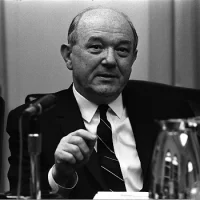During the Cold War, the United States and the USSR engaged in a zero-sum game throughout the globe; while mutually assured destruction prevented the two nuclear superpowers from fighting a hot war, they did conduct an extensive war of proxies on nearly every continent. In the 1970s, just as Saigon – and American influence in… Read More "The Search for Peace in Southern Africa – Oil, Angola, and the Proxy Wars"
The Paris Peace Conference — 1946
At the Paris Peace Conference, which lasted from July to October 1946, negotiators from the United States, Soviet Union, United Kingdom, France, and other Allied powers agreed upon the provisions of the Paris Peace Treaties, signed in February 1947 with Italy, Romania, Hungary, Bulgaria, and Finland. These agreements included monetary reparations, territorial adjustments, and political… Read More "The Paris Peace Conference — 1946"
France has de Gaulle to Withdraw from NATO
On June 21, 1966, France made the somewhat shocking move to withdraw its troops from the North Atlantic Treaty Organization (NATO). This decision led by French president Charles de Gaulle complicated relations between the U.S. and Europe amidst clashing American and Communist spheres of influence. Though France remained politically in NATO, its actions cast doubt… Read More "France has de Gaulle to Withdraw from NATO"
Dean Rusk served as Secretary of State for eight controversial years, from 1961 through 1969, when public discomfort over his daughter’s interracial marriage prompted him to offer his resignation. (LBJ refused to accept it.) He ended up serving through the end of Johnson’s term. Born February 9, 1909, David Dean Rusk spent his early years…
Caught in a Honeypot – Marine Clayton Lonetree Betrays His Country
Marine Security Guard Clayton Lonetree was seduced by a Russian woman, “Violetta Seina,” at the annual Marine Corps Ball in November 1985. She worked as a telephone operator and translator for Embassy Moscow but lived a double life as a KGB agent. Lonetree was so highly regarded that he was chosen to be part of… Read More "Caught in a Honeypot – Marine Clayton Lonetree Betrays His Country"
The Fall of Dien Bien Phu and the Rise of U.S. Involvement in Vietnam
Dien Bien Phu was a major battle of the first Indochina war in which the French fought against the Viet Minh communists. The French objective had been to support the soldiers at Dien Bien Phu, deep in the hills of northwestern Vietnam to cut off Viet Minh supply lines into neighboring Laos. The Viet Minh, however, were able… Read More "The Fall of Dien Bien Phu and the Rise of U.S. Involvement in Vietnam"
Remembering Pope John Paul II
John Paul II was one of the most charismatic popes in recent history, a rock star who attracted millions during his frequent trips abroad and who was considered a beacon of hope for people in his native Poland. Born Karol Joseph Wojtyła on May 18, 1920 in Wadowice in southern Poland, he was elected pope… Read More "Remembering Pope John Paul II"
Constant Companions: KGB Stalking of FSOs
Revanchist policies from the Kremlin, crackdowns on protesters – lately with Russia it seems like everything old is new again. So perhaps it’s time to look back at the very embodiment of Cold War tensions – the infamous KGB (Komitet Gosudarstvennoy Bezopasnosti, or Committee of State Security). Rarely violent but often threatening, the constant presence of… Read More "Constant Companions: KGB Stalking of FSOs"
Making the World a Safer Place — Nuclear Arsenals and the Fall of the USSR
Imagine what Europe would be like today if Belarusian strongman Aleksandr Lukashenka were able to threaten his neighbors with nuclear weapons. Or how much tenser the situation in Ukraine would be if Kyiv had access to the bomb — Would Putin grab just Crimea or would he be tempted to take all of Ukraine to… Read More "Making the World a Safer Place — Nuclear Arsenals and the Fall of the USSR"
The Downing of KAL Flight 007
On August 30, 1983, a Boeing 747, Korean Airlines 007 took off for Seoul from New York’s John F. Kennedy International Airport. With 246 passengers and 23 crew on board, the routine yet ill-fated flight would never complete the second leg of its journey from Anchorage to Gimpo Airport. Significantly off course, Captain Chun Byung-In… Read More "The Downing of KAL Flight 007"

